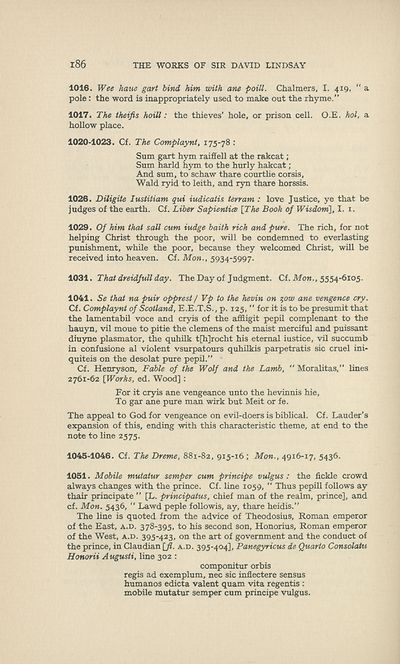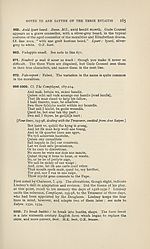Scottish Text Society publications > Third series > Works of Sir David Lindsay of the Mount, 1490-1555 > Volume 4, 1936
(254)
Download files
Complete book:
Individual page:
Thumbnail gallery: Grid view | List view

i86
THE WORKS OF SIR DAVID LINDSAY
1016. Wee haue gart bind him with ane poill. Chalmers, I. 419, “ a
pole : the word is inappropriately used to make out the rhyme."
1017. The theifis hoill: the thieves’ hole, or prison cell. O.E. hoi, a
hollow place.
1020-1023. Cf. The Complaynt, 175-78 :
Sum gart hym raiffell at the rakcat;
Sum harld hym to the hurly hakcat ;
And sum, to schaw thare courthe corsis,
Wald ryid to leith, and ryn thare horssis.
1026. Diligite lustitiam qui iudicatis terram : love Justice, ye that be
judges of the earth. Cf. Liber Sapienties [The Book of Wisdom], I. 1.
1029. Of him that sail cum iudge baith rich and pure. The rich, for not
helping Christ through the poor, will be condemned to everlasting
punishment, while the poor, because they welcomed Christ, will be
received into heaven. Cf. Mon., 5934-5997.
1031. That dreidfull day. The Day of Judgment. Cf. Mon., 5554-6105.
1041. Se that na puir opprest / Vp to the hevin on %ow ane vengence cry.
Cl. Complaynt of Scotland, E.E.T.S., p. 125, " for it is to be presumit that
the lamentabil voce and cryis of the affligit pepil complenant to the
hauyn, vil moue to pitie the clemens of the maist merciful and puissant
diuyne plasmator, the quhilk t[h]rocht his eternal iustice, vil succumb
in confusione al violent vsurpatours quhilkis parpetratis sic cruel ini-
quiteis on the desolat pure pepil.’’
Cf. Henryson, Fable of the Wolf and the Lamb, " Moralitas,” lines
2761-62 [Works, ed. Wood]:
For it cryis ane vengeance unto the hevinnis hie.
To gar ane pure man wirk but Meit or fe.
The appeal to God for vengeance on evil-doers is biblical. Cf. Lauder’s
expansion of this, ending with this characteristic theme, at end to the
note to line 2575.
1045-1046. Cf. The Dreme, 881-82, 915-16 ; Mon., 4916-17, 5436.
1051. Mobile mutatur semper cum principe vulgus : the fickle crowd
always changes with the prince. Cf. line 1059, " Thus pepill follows ay
thair principate ” [L. principatus, chief man of the realm, prince], and
cf. Mon. 5436, “ Lawd peple followis, ay, thare heidis."
The line is quoted from the advice of Theodosius, Roman emperor
of the East, a.d. 378-395, to his second son, Honorius, Roman emperor
of the West, a.d. 395-423, on the art of government and the conduct of
the prince, in Claudian [fl. a.d. 395-404], Panegyricus de Quarto Consolatu
Honorii Augusti, line 302 :
componitur orbis
regis ad exemplum, nec sic inflectere sensus
humanos edicta valent quam vita regentis :
mobile mutatur semper cum principe vulgus.
THE WORKS OF SIR DAVID LINDSAY
1016. Wee haue gart bind him with ane poill. Chalmers, I. 419, “ a
pole : the word is inappropriately used to make out the rhyme."
1017. The theifis hoill: the thieves’ hole, or prison cell. O.E. hoi, a
hollow place.
1020-1023. Cf. The Complaynt, 175-78 :
Sum gart hym raiffell at the rakcat;
Sum harld hym to the hurly hakcat ;
And sum, to schaw thare courthe corsis,
Wald ryid to leith, and ryn thare horssis.
1026. Diligite lustitiam qui iudicatis terram : love Justice, ye that be
judges of the earth. Cf. Liber Sapienties [The Book of Wisdom], I. 1.
1029. Of him that sail cum iudge baith rich and pure. The rich, for not
helping Christ through the poor, will be condemned to everlasting
punishment, while the poor, because they welcomed Christ, will be
received into heaven. Cf. Mon., 5934-5997.
1031. That dreidfull day. The Day of Judgment. Cf. Mon., 5554-6105.
1041. Se that na puir opprest / Vp to the hevin on %ow ane vengence cry.
Cl. Complaynt of Scotland, E.E.T.S., p. 125, " for it is to be presumit that
the lamentabil voce and cryis of the affligit pepil complenant to the
hauyn, vil moue to pitie the clemens of the maist merciful and puissant
diuyne plasmator, the quhilk t[h]rocht his eternal iustice, vil succumb
in confusione al violent vsurpatours quhilkis parpetratis sic cruel ini-
quiteis on the desolat pure pepil.’’
Cf. Henryson, Fable of the Wolf and the Lamb, " Moralitas,” lines
2761-62 [Works, ed. Wood]:
For it cryis ane vengeance unto the hevinnis hie.
To gar ane pure man wirk but Meit or fe.
The appeal to God for vengeance on evil-doers is biblical. Cf. Lauder’s
expansion of this, ending with this characteristic theme, at end to the
note to line 2575.
1045-1046. Cf. The Dreme, 881-82, 915-16 ; Mon., 4916-17, 5436.
1051. Mobile mutatur semper cum principe vulgus : the fickle crowd
always changes with the prince. Cf. line 1059, " Thus pepill follows ay
thair principate ” [L. principatus, chief man of the realm, prince], and
cf. Mon. 5436, “ Lawd peple followis, ay, thare heidis."
The line is quoted from the advice of Theodosius, Roman emperor
of the East, a.d. 378-395, to his second son, Honorius, Roman emperor
of the West, a.d. 395-423, on the art of government and the conduct of
the prince, in Claudian [fl. a.d. 395-404], Panegyricus de Quarto Consolatu
Honorii Augusti, line 302 :
componitur orbis
regis ad exemplum, nec sic inflectere sensus
humanos edicta valent quam vita regentis :
mobile mutatur semper cum principe vulgus.
Set display mode to: Large image | Zoom image | Transcription
Images and transcriptions on this page, including medium image downloads, may be used under the Creative Commons Attribution 4.0 International Licence unless otherwise stated. ![]()
| Publications by Scottish clubs > Scottish Text Society publications > Third series > Works of Sir David Lindsay of the Mount, 1490-1555 > Volume 4, 1936 > (254) |
|---|
| Permanent URL | https://digital.nls.uk/107277923 |
|---|
| Shelfmark | SCS.STES3.8 |
|---|---|
| Attribution and copyright: |
|
| Description | A collection of over 100 Scottish texts dating from around 1400 to 1700. Most titles are in Scots, and include editions of poetry, drama, and prose by major Scottish writers such as John Barbour, William Dunbar, Gavin Douglas, and George Buchanan. Edited by a key scholarly publisher of Scotland's literary history, and published from the late 19th century onwards by the Scottish Text Society. Available here are STS series 1-3. |
|---|

